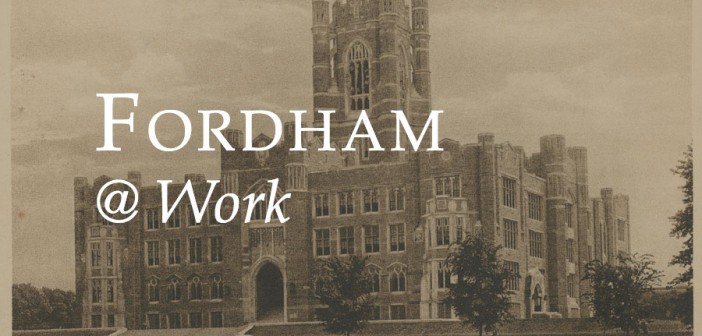
Photo by Tom Stoelker
Michael Wares, FCRH ’69
Who He Is
Assistant Director of Technical Services in Fordham University Libraries, New York State’s fifth-largest library with more than 2 million books.
What He Does
He is responsible for acquisitions (every item, be it book, serial, electronic item purchased for the library), cataloging (those items entered into the online system for access to all), electronic resources (all electronic databases and serials), and all library systems.
Where He’s From
“I was born not quite in the shadow of Keating Hall—but almost.”
Schooling
Fordham Prep, Fordham College at Rose Hill, New York University, The School of Library Service at Columbia University founded by Melvil Dewey (of Dewey Decimal system).
Recent Awards
Wares received his 40-year service medal from Fordham in 2011.
“I told Father McShane, ‘I’m just doing this until something better comes along.’”
Fordham Library in the
Pre-Digital Era
“I was in the basement of Keating, which was the library annex. I started out in cataloging and put on spine labels. I am one of two people left who can put a catalog card in a typewriter and make the correct margins with my eyes closed.”
On the Transition to Digital
“In the 90s there was a lot of talk about the electronic library, but we were so busy doing it we didn’t realize how fast it was happening. We started adding electronic resources and all the sudden we realized it’s here.”
Fordham Library in the
Post-Digital Era
“In ’97 we moved into Walsh Library and we had light and air for the first time. I’m still in the basement but I have a window. I can’t think of a single thing that is the same now. Of course, books are still circulating and we still see people in the stacks, but there’s many more people using our resources remotely, accessing 400 different databases. This past year we rolled out OneSearch, which will allow users to search all our resources from one portal.”
On Print vs. Digital
“I don’t have that romantic view [on the print era]. I’m more interested in the content in a usable form. We have some researchers who will read a book in hard copy then will ask for it in digital so they can search or cut and paste what they need. The formats enhance each other. I think a book is in many ways a better portable device, but I can’t imagine being without electronic texts.”
On the Library of the Future
“I think the book stacks will be relatively the same proportion, but they’ll continue modest growth. We’ll see fewer library-provided computers because people will carry their own device—or maybe they’ll be wearing Google glasses.”

